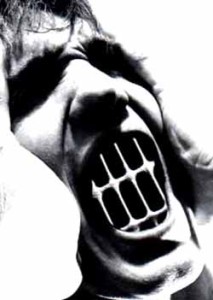Prison doctors, psychiatrists and psychologists are currently complicit in the abuse and psychological torture of mentally ill prisoners held in a brutal jail control-unit at Woodhill Prison in Milton Keynes.
In 1998 the then labour government introduced the so-called Close Supervision Centres (CSC) as a method of punishing and controlling “difficult” and “unmanageable” prisoners, and explicitly defined both the purpose of the CSC and the type of prisoners it was created to hold. The CSC was designed as an overt weapon of punishment based behaviour modification against prisoners motivated to cause unrest and disruption in mainstream prison regimes; essentially the type of prisoners targeted were “subversives” and violent troublemakers. It was never openly said that within this group of control-problem prisoners earmarked for the CSC would be included prisoners suffering with mental illness or suicide tendencies. Never was it admitted that within a control unit characterised by endemic staff violence and brutality would mentally disturbed and damaged prisoners be subjected to the same degree of abuse and ill-treatment. Yet in August of this year Claire Hodson, operational manager of the CSC at Woodhill Prison, openly stated that a significant number of the prisoners held in the CSC suffered with what she described as a “mental disorder”. Information provided by prisoners within the Woodhill CSC describes such mentally damaged prisoners being driven beyond the limits of psychological endurance by a regime characterised by solitary confinement, sensory deprivation and brutality. The involvement of prison hired doctors and psychiatrists in either mitigating the increased mental trauma and damage caused to such prisoners by the CSC regime or vetting out completely such mentally ill and vulnerable prisoners from the CSC appears minimal or non-existent, which amounts to obvious collusion in the ill-treatment of such prisoners.
Historically of course the collusion and collaboration of the prison doctors, psychiatrists and psychologists in the ill-treatment and repression of prisoners has a long and infamous tradition. In the 1960s and 1970s compliant prison employed psychiatrists frequently and unlawfully assisted prison staff to control and subdue “unmanageable” prisoners by forcefully and unlawfully administering psychotropic drugs in a practice that became known as the “liquid cosh”. Jail psychiatrists also provided their authority to medicate the resistance of rebellious prisoners by facilitating their removal to high-security mental hospitals such as Broadmoor and Rampton in a form of punishment that was known as “Nutting off”. During the 1980s the removal of “difficult” prisoners to jail psychiatric units such as the notorious “F.2.” unit at Parkhurst Maximum-Security jail represented the ultimate punishment for those prisoners too “unmanageable” to be handled in ordinary prison segregation units; few prisoners emerged from places like “F.2.” seriously undamaged psychologically or punch-drunk from the constant “sedation” of mind-destroying drugs administered by completely amoral prison hired psychiatrists. In the totalitarian society of prison such psychiatrists freed from any accountability or legal sanction align themselves completely with the institutional interests of prison regimes and often gladly participated in the institutional abuse of prisoners.
Punishing mentally ill prisoners for behaviour associated with their illness is both morally reprehensible and a unarguable abuse of basic human rights, and all those involved in administering the regime in the CSCs under which mentally ill prisoners are effectively being tortured should be held legally accountable.
During the 1980s a then Tory government with a ruthless antipathy towards state financed and administered health care closed most of the large psychiatric hospitals and caste it’s inmates and patients effectively onto the streets under the heading and illusion of “care in the community”. Many of those patients then found their way into the prison system, somewhere hopelessly ill-equipped and disinclined to deal with them in a medically appropriate and therapeutic way. Some of that same group, because of their more “confrontational behaviour” towards prison authority, as defined and interpreted by guards trained only in how to control and lock people up, will find their way into punishment orientated prison segregation-units where further and more deeper brutalisation will take place and greater damage inflicted. Those who respond to that with a more resilient streak of resistance or “inappropriate behaviour” will at some point find themselves consigned to a CSC, where the prison system will really go to work on their minds and spirits. Self-mutilation will then usually manifest itself, and within the Woodhill jail CSC levels of self-harm are disproportionately high (earlier this year a mentally ill prisoner in the Woodhill CSC completely severed both his ears whilst in the showers and in possession of a razor blade), something it’s operational manager Claire Hodson knowledgeably describes as a “coping mechanism or as a maladaptive coping strategy, as well as diagnosis of one or more personality disorders”. And yet she is responsible for enforcing a regime deliberately intended to inflict the worst possible psychological damage upon this particular category of “difficult” prisoners.
The psychological torture and abuse of the mentally ill anywhere in society is a crime and the CSCs are therefore responsible for operating regimes that are intrinsically unlawful and should be closed and shut down.
In 1984 a prisoner, Michael Williams, instigated a high profile legal action against the prison system and Home Office, one supported by the then National Council for Civil Liberties, that challenged the lawfulness of the Wakefield Prison “Special Control Unit” on the grounds that it’s regime breached the basic human rights of the prisoners held there. Although his legal action failed it raised the public profile of the Control Unit experiment (originally used on suspected Irish Republican combatants and outlawed by the European Court of Human Rights) and Wakefield closed the control unit. The regime operating in the CSCs, especially in terms of it’s treatment of mentally ill prisoners, needs to be similarly challenged and exposed, and the behaviour of those trying to legitimize the abuse inherent in that regime and paid to oversee it held fully and publicly accountable.
John Bowden
HMP Shotts
30/9/2011
http://leedsabc.org/the-abuse-of-mentally-ill-prisoners-held-in-close-supervision-centres/
